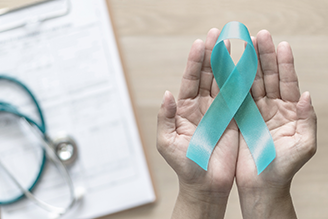The Fight Against Ovarian Cancer

Did you know that an estimated 14,000 women will lose their lives to ovarian cancer this year? Additionally, the pap test does not detect ovarian cancer. Due to a lack of early detection tests, 80% of the time, ovarian cancer is not detected until it has reached an advanced stage. That is why the month of September is designated to ovarian cancer awareness in the United States.
Because ovarian cancer is difficult to detect, it is important to know the signs and symptoms and to receive regular health checkups with your gynecologist.
What are symptoms of ovarian cancer?
Ovarian cancer rarely causes symptoms early on, and in later stages, symptoms are often brushed off. They can include feeling unusually full, bloating, weight loss, a frequent need to urinate, discomfort in the pelvis area, and constipation or other changes in bowel habits. It is important to discuss these symptoms (and other things you may be experiencing) with your doctor at your regular checkups.
Who gets ovarian cancer?
About 1 in 78 women will be diagnosed with ovarian cancer during their lifetime. There are certain factors that can increase a woman’s risk for getting ovarian cancer. These include having a close family member that had ovarian cancer, having an eastern European or Ashkenazi Jewish background, having endometriosis, being middle aged or older, or having difficulties getting pregnant. Of course, you are still at risk of getting ovarian cancer even if none of these factors apply to you, so it is important to pay attention to your health.
How is ovarian cancer treated?
Ovarian cancer can be treated in two ways, and often a combination of them: surgery or chemotherapy. During a surgical operation, cancerous tissue is removed. Chemotherapy is a form of medicine that kills the cancer that can be taken in the form of a pill or intravenously.
If you are diagnosed with ovarian cancer, you will be referred to a gynecologic oncologist who specializes in the treatment of cancers in women’s reproductive systems. Your doctor will help you decide the best form of treatment for you.
How can I help in the fight against ovarian cancer?
The National Ovarian Cancer Coalition has a lot of resources and ways that you can support and join the fight! The September awareness campaign focuses on earlier awareness of symptoms and the lack of an early detection test. You can spread awareness by sharing on social media and following #KnowOvarian, join a local Run/Walk, wear a teal ribbon (symbolizing ovarian cancer support), or talking with friends and family about your experiences with ovarian cancer. Find more information at ovarian.org.
If you’d like to speak with one of our providers at Cheyenne OBGYN about ovarian cancer, please schedule an appointment with us at 307-634-5216.

Leave a Reply